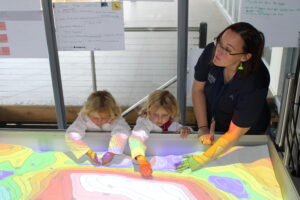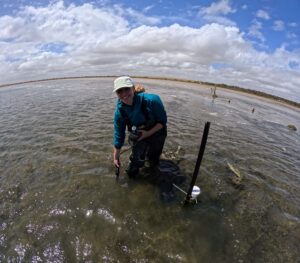Adelaide could soon become a much harsher place to live as extreme temperature events become more common, alongside more frequent and intense floods and droughts. Increasing urbanisation is also reducing the amount of vegetation in the landscape and decreasing water retention.
Water management is at the heart of these issues in Adelaide. We need water to support the plants that will help keep the city cool, mitigate climate change and improve liveability. Healthy waterways are also essential for our wellbeing and resilience.
A report released by the Goyder Institute for Water Research this week outlines key actions and policy recommendations for urban water management that will help address the impact of rising urbanisation and climate change.
Current Goyder Institute Management Board member and Director of Water Security, Policy and Planning in the South Australian Department for Environment and Water, Mr Dan Jordan, welcomed the release of the new research report.
“Building on many significant contributions over more than a decade, this body of research on urban water management is another example of the Goyder Institute delivering research insights that have the potential to significantly influence water-related public policy, as our towns and cities grapple with major challenges around urbanisation and climate change,” said Mr Jordan.
“This Goyder Institute research will be particularly useful for informing the current work of the Stormwater Expert Panel, which was commissioned in response to key recommendations in the 2022 Urban Water Directions Statement, as well as efforts to deliver against the State Government’s Integrated Water Management election commitment.”
The Goyder Institute for Water Research brought together a transdisciplinary and multi-organisational team of water experts to help tackle these challenges and identify urban water management opportunities to help secure Adelaide’s future.
Led by Dr Baden Myers (UniSA), the project team focused on finding the best ways to restore Adelaide’s urban ecology and waterways and explored new governance, funding and policy options.
“It was important that we take a multidisciplinary approach on this project. We brought together civil engineers, water scientists, ecologists and social scientists from the University of South Australia, Adelaide University, Flinders University, Monash University and CSIRO to review our urban water management policy and technical needs,” said Dr Baden Myers, University of South Australia.
“Our recommendations were then reviewed by engineers, scientists and policy-makers in state government, local government, SA Water, and industry bodies to make sure they were realistic and achievable.”
“We’re confident our final recommendations reflect the technical and policy needs to tackle urban water management challenges into the future,” Dr Myers said.
The team found that healthy waterways (blue spaces) and urban vegetation (green spaces) could best be supported by:
- ‘smart,’ integrated ‘blue–green’ catchment management plans. These should be designed to retain water in the landscape, prevent and delay stormwater from moving into receiving waters, and improve waterway and coastal environment condition
- a connected and integrated water harvesting and reuse scheme across Adelaide
- a program to research, monitor, and evaluate the effectiveness of on-ground actions to increase urban vegetation, limit runoff, and reduce the levels of fine sediments travelling to Adelaide’s coastline
- a robust monitoring and compliance program in new and existing developments, with a particular focus on how water quality will affect receiving waters.
The project team also reviewed national and international urban water management models and prepared costs–benefit analyses for five possible new governance options, including associated legislative changes.
Among the recommendations are updates to the Water Industry Act 2012 and other legislation that would enable new governance arrangements to manage stormwater for flood control and as an integrated water resource for achieving economic, cultural, environmental and social outcomes.
Proposed amendments to planning laws would also make sure that the true value of stormwater management is realised and that all new developments have appropriate regard for its value.
The Institute has previously provided advice to the Department of Environment and Water (DEW) which has informed the 2022 Urban Water Directions Statement. Now, this new report is now being considered by a range of stakeholders including those involved in making recommendations to government on future funding and governance arrangements for stormwater.
You can read the project team’s findings in full here or contact the Goyder Institute for Water Research for more information.
Goyder Institute project team
Baden Myers (Surface water hydrology, UniSA); Mellissa Bradley (Integrated water management, Water Sensitive SA); Chris Chesterfield (Governance, Monash University); Lin Crase (Economics, UniSA), Tanya Doody (Ecology, CSIRO), Howard Fallowfield (Water treatment, Flinders University), Huade Guan (Urban cooling, Flinders University), Martin Lambert (Surface water hydrology, The University of Adelaide), Tim Muster (Water technologies, CSIRO), Bruce Naumann (Stormwater harvesting and recycling, City of Salisbury), Melissa Jane Nursey-Bray (Social science, The University of Adelaide), Margaret Shanafield (Groundwater, Flinders University), Rachel Barratt (Policy and Planning, Jacobs)
Stakeholder reference group
A stakeholder reference group also reviewed and provided input into the report, with representatives from the South Australian Department for Environment and Water, SA Water Corporation, Green Adelaide, the Local Government Association of South Australia, Stormwater South Australia, the City of Marion, the South Australian Environment Protection Authority and the South Australian Stormwater Management Authority.



